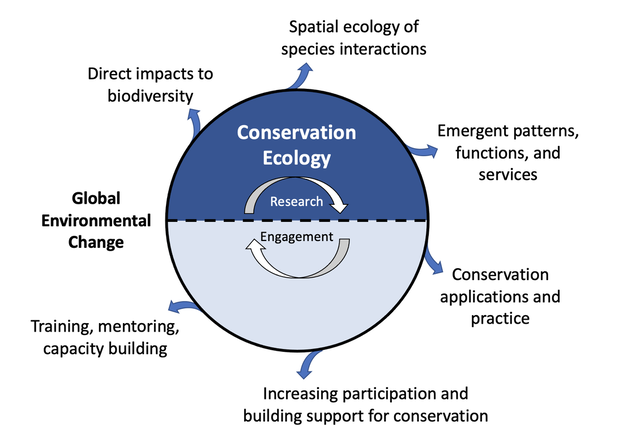My research examines the ecology and conservation of biotic communities under global change.
Specifically, I study how land use and climate change impact the distributions, structure, and functioning of biotic communities.
My work is applied, quantitative, and grounded in natural history. I integrate information across various spatial scales (from hyperlocal to macroecological) and levels of biological organization (from individuals to metacommunities) to inform conservation and management. I have worked with many taxa and study systems, but find working with birds and in forest ecosystems most compelling.
My current and future research is motivated by three driving questions:
Specifically, I study how land use and climate change impact the distributions, structure, and functioning of biotic communities.
My work is applied, quantitative, and grounded in natural history. I integrate information across various spatial scales (from hyperlocal to macroecological) and levels of biological organization (from individuals to metacommunities) to inform conservation and management. I have worked with many taxa and study systems, but find working with birds and in forest ecosystems most compelling.
My current and future research is motivated by three driving questions:
- How do environmental changes occurring across multiple scales reshape species distributions and biotic interactions?
- How do we leverage this information to inform the conservation and management of functional ecosystems?
- How do we integrate research, teaching, and community engagement to achieve more effective and equitable conservation and educational outcomes?
My vision for a community-engaged Conservation Ecology

The goal of my work is to understand and address the consequences of global environmental change for people and nature. Echoing Aldo Leopold’s Land Ethic, the process of achieving conservation is “an intellectual as well as an emotional process” (Leopold 1949), as reflected in the two hemispheres in this diagram. Moving clockwise from the left, my research combines studies of individual species, biotic interactions, and spatial dynamics to assess human impacts on ecosystem processes and functions. Crossing over to the engagement side, my research is solution-oriented and has direct applications in conservation. Equally important is effective community engagement, teaching, and mentoring to expand access to nature, build public support for conservation, and train the next generation of conservation scientists. This includes service and advocacy to address inequalities that prevent marginalized communities from participating in conservation, accessing education, and living happy, healthy lives. This vision of Conservation Ecology is an iterative process in which research and engagement feed off each other to maximize their impact.
